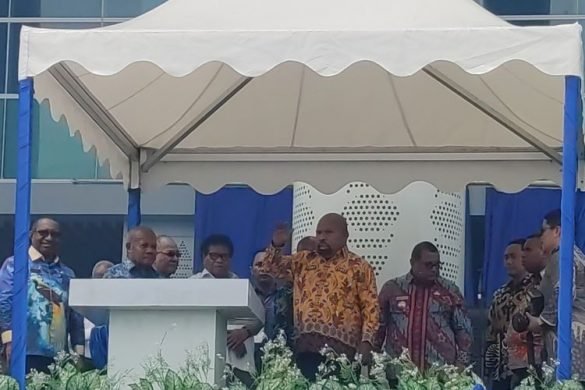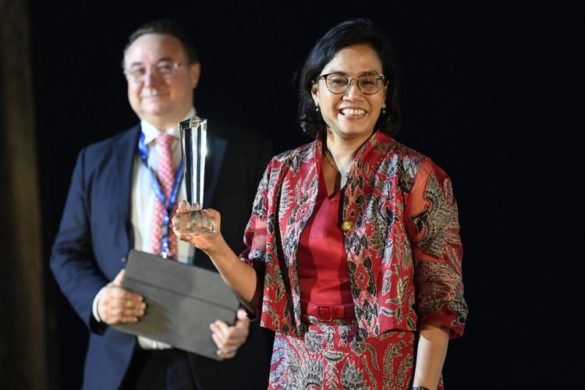BENDERRAnews, 3/10/18 (Jakarta): This a new article from one of the biggest media in Asia Pasific: NIKKEI, Asian Review. Indonesian tycoon Mochtar Riady has been contemplating the question of succession for nearly 30 years. Part of the answer, he thinks, lies in Chinese folk wisdom about failure.
Nikkei recently caught up with the 89-year-old and asked about his plans for ceding control of his Lippo Group conglomerate, which has evolved over more than half a century from a domestic bank to a property and retail empire with assets reportedly exceeding $10 billion. The challenge for the next generation is to spearhead another reinvention, this time in health care and e-commerce.
As Mochtar’s grandson and heir apparent, 33-year-old John Riady is expected to build on the group’s — and learn from brushes with controversy and defeat.
Mochtar, in the interview on July 5, brought up a Chinese tale of how eagles teach their young to fly by letting them go in the air. The moral of the story is to let one’s offspring learn from mistakes. Then he bluntly declared that John had “failed” with an online shopping business.
John attempted to make his mark with MatahariMall.com, an online marketplace offering a wide range of women’s fashions. The site was launched with great fanfare in 2015 but has struggled to build its user base. Meanwhile, rivals such as Tokopedia and Bukalapak have become unicorns — privately held startups valued at $1 billion or more.
“I told John, ‘You made a big mistake, because you always think about buyers but you never think of sellers,” Mochtar said, referring to consumers and merchants. “That was your mistake.'”
MatahariMall.com counted 4.6 million monthly visitors in the second quarter of this year, according to iPrice Group, versus 111 million for Tokopedia and 85 million for Bukalapak.
But if Mochtar is unimpressed with his grandson’s handling of the online mall, John seems to be making up for it with e-money.
In July, restaurants on the first floor of the Gandaria City shopping mall in southern Jakarta started accepting Ovo, an e-payment platform Lippo launched last year. In front of every eatery stands a purple Ovo signboard promising “10% cash back” and other deals.
The Ovo logo is also appearing more in Surabaya, Medan, Bandung and other cities. The group says its e-money can be used at 200 malls and 5,000 restaurants nationwide. By transaction volume and value, the operator says it is the No. 1 player in an Indonesian e-payments market that grew 434% in the first half of 2018.
Ovo symbolizes Lippo’s path forward in more ways than one: It is a further step into digital technology and e-commerce for a group Mochtar founded in the 1950s. And it is run by John.
“Now John operates Ovo and [has found] success,” Mochtar said. The founder argues it is just as important to keep merchants in mind in the e-payments business, since Ovo’s future depends on how many stores introduce it.
Mochtar is showing few signs of slowing down. But he is pushing 90 and his second son, James Riady, who supervises Lippo’s core operations in Indonesia, is 61. That is a year older than Mochtar was when he started thinking about passing the reins to his descendants.
Lippo is under pressure to put John and other third-generation family members in charge sooner rather than later. In relatively young Indonesia, where the median age is around 30, youth could be an advantage.
John, currently a Lippo Group director, is the eldest son of James, the group’s CEO.
James is credited with expanding the domestic real estate business after the Asian financial crisis of 1997 spurred the group to divest its banking operations and transform into a property developer. He also led the conglomerate’s forays into health care and education. But he has encountered his own tough lessons over the years.
Lippo Group kept a cautious distance from the Suharto government that ruled Indonesia for three decades. This stood in contrast to the approach of the late Sudono Salim, the founder of Salim Group and Mochtar’s longtime business partner. Salim maintained close ties with Suharto’s authoritarian regime.
Since Lippo kept Suharto at arm’s length, it avoided significant damage from the strongman’s downfall. Yet, in the U.S., Lippo became embroiled in a major political fundraising scandal.
The group acquired a bank in the state of Arkansas and the young James took charge of its management. In the process, he became acquainted with then-Governor and future President Bill Clinton. This connection would prove costly, both financially and in terms of Lippo’s reputation.
James became involved in fundraising for Clinton and ran afoul of federal election law. In 2001, he pleaded guilty to a conspiracy to “defraud the United States by unlawfully reimbursing campaign donors with foreign corporate funds,” according to a release by the Department of Justice. This brought an $8.6 million fine, a record for a campaign finance violation at the time.
The department said that in 1992, soon after James pledged $1 million to Clinton’s presidential campaign, contributions made by another Lippo executive “were reimbursed with funds wired from a foreign Lippo Group entity into an account Riady maintained at LippoBank and then distributed to [the executive] in cash.” The department said the contributions were made, in part, to secure “access, meetings and time with politicians, elected officials and other high-level government officials.”
Looking back on the scandal, James said: “Power is both a blessing and curse. Since that time, I have attempted with all my heart to avoid politics.”
To cope with the pressure of inheriting a huge conglomerate, James stressed the need to separate “vision and ambition.” The line between them, he said, is often blurred.
In an English-language autobiography published in 2016, titled “Mochtar Riady: My Life Story,” Mochtar writes that he began considering how to hand the reins to James and his third son, Stephen, when he turned 60 in 1989.
In the early 2000s, James started supervising Lippo Group’s domestic businesses, including Lippo Karawaci, its core property developer. Stephen was put in charge of overseas operations based in Hong Kong and Singapore, and he is now executive chairman of OUE, a Singaporean real estate company Lippo acquired from United Overseas Bank in 2006.
Mochtar told Nikkei he is no longer active in the group’s management, joking that he would not be receiving any phone calls during the interview. But he also said he still provides management “guidance.”
Several insiders said Mochtar continues to play a pivotal part in making important decisions.
Day-to-day operations are largely left to a team of professional managers. “How can [we] manage the business with two sons and three grandsons?” the tycoon said, emphasizing the importance of recruiting the right people and separating ownership from management.
Lippo’s diversification has helped it meet its own personnel needs.
Thanks in part to James, the group has become a major education player, running schools across all levels from elementary to university. Its Pelita Harapan University has become one of the country’s top private institutions, with campuses in Jakarta suburbs, Surabaya and elsewhere. The university provides Lippo with a steady stream of new recruits.
The group also has an army of middle managers with extensive experience at overseas banks and other businesses. And its workforce is international, with over 300 team members from outside Indonesia.
Recruiting has had its pitfalls, too, however. Emirsyah Satar, a former CEO of national airline Garuda Indonesia, was brought in to serve as chairman of MatahariMall.com, only to wind up being investigated on suspicion of taking bribes at the carrier.
As for the Riady family’s role in running things, Mochtar said it is “to look at balance sheets and give directions.”
Of course, someone still has to give those directions.
In November 2016, James told Nikkei that family succession was not necessarily a given. “We must be mindful of succession but it is not automatic that our family members are qualified to take the jobs,” he said. “We must have patience and learn discipline.”
Even so, John is clearly being groomed to lead the way.
John was educated mainly in the U.S., receiving an MBA from the Wharton School of Business at the University of Pennsylvania and a juris doctor from Columbia University’s law school. Last September, he became president commissioner of the group’s health care business, Siloam International Hospitals — the largest hospital chain in Indonesia. He also serves as commissioner of Matahari Department Store.
If and when John takes the helm, the question will be how to help new operations retain momentum and old ones regain it.
Under Stephen’s leadership, OUE is expanding the international scope of its hospital business.
Last year, OUE Lippo Healthcare teamed up with China Merchants Group, a state-run Chinese company, to start operating hospitals in China. OUE also runs hospitals and nursing homes in Japan with trading house Itochu. Mochtar said the idea is to soak up expertise for efficient management that can be put to use in China.
But while the group’s hospital operations and Ovo e-payment service are on the rise, its key property business is not.
The stock price of Lippo Karawaci is two-thirds lower than it was two years ago. In April, Moody’s Investors Service downgraded the company’s credit rating to B2 from B1.
Moody’s expressed concern over Lippo Karawaci’s operating cash flow, with analyst Jacintha Poh warning the flow would be dependent on “asset sales that are subject to delays and market conditions.”
Another worry is Meikarta, an enormous Lippo urban development project on the outskirts of Jakarta.
Meikarta, a 273 trillion rupiah ($18.32 billion) investment and Lippo’s biggest project yet, is to include condominiums and offices along with malls, schools, medical facilities and luxury hotels. In other words, Lippo is pouring all of its expertise — property development, education and health care — into a new city that will be home to 1 million residents.
The endeavor marks an important shift from high-end properties to more affordable housing for Indonesia’s growing middle class. Local news reports, though, have suggested the project is stalled — something Mochtar has strongly denied, insisting anyone can look at the construction site to see that work is progressing.
Tensions escalated on May 30, when a group of homebuyers in Manado, North Sulawesi Province, enraged by delays briefly held Lippo Karawaci President Ketut Budi Wijaya hostage, according to local reports.
The trouble adds an extra element of uncertainty as Lippo looks to marry its traditional businesses with the digital operations led by John Riady. Soon, like the eagles of Chinese folklore, John may have to prove he can fly. (B-AR/jr)
*) According to NIKKEI, Asian Review, by
“ASIAN FAMILY CONGLOMETATES, Lippo tycoon looks to young-gun to build digital empite”
(The Nikkei Asian Review will begin publishing Mochtar Riady’s “My personal history,” an autobiographical series, on Monday).





















